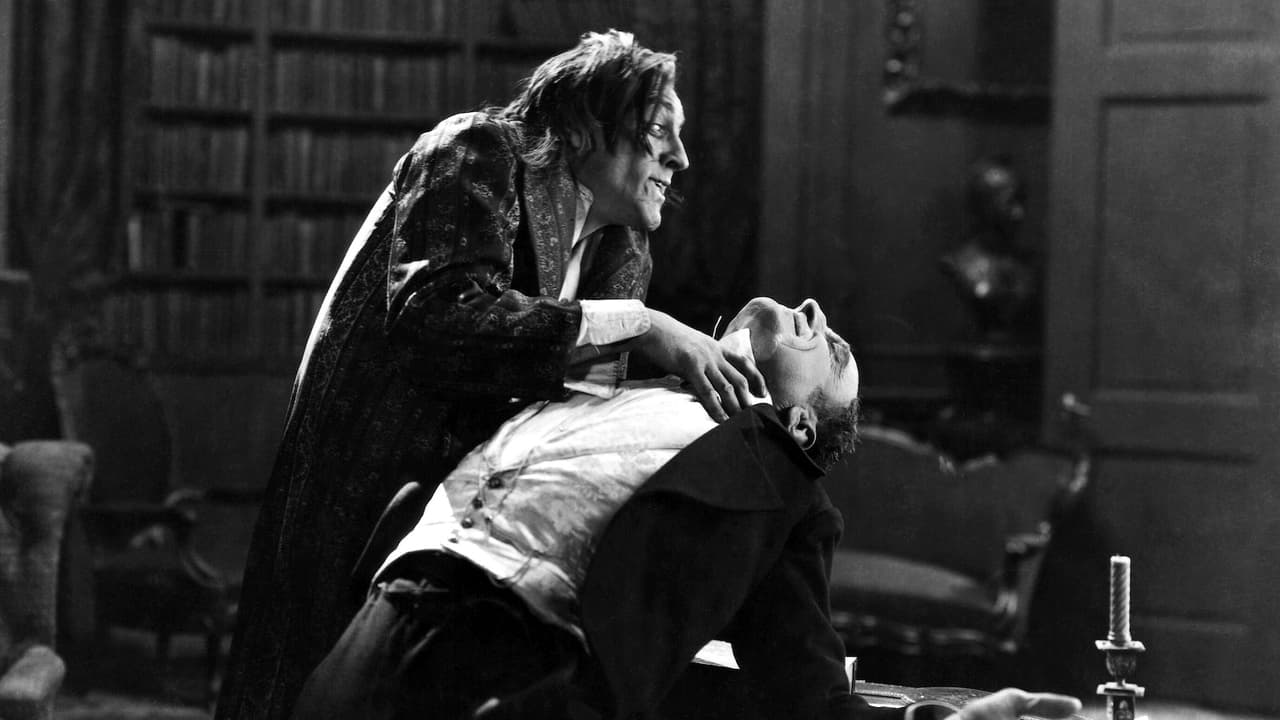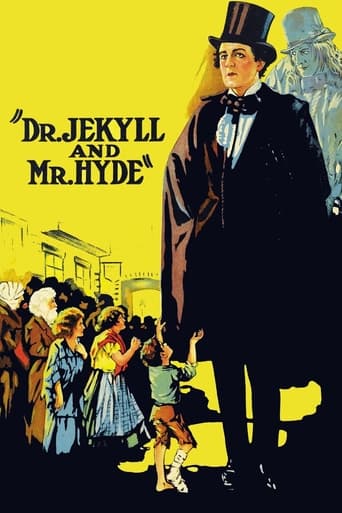Lumsdal
Good , But It Is Overrated By Some
Brennan Camacho
Mostly, the movie is committed to the value of a good time.
Jemima
It's a movie as timely as it is provocative and amazingly, for much of its running time, it is weirdly funny.
Fleur
Actress is magnificent and exudes a hypnotic screen presence in this affecting drama.
Rainey Dawn
Jekyll & Hyde 1920 really is a good silent horror film. I would not say all silent films are good just because they are the first moving pictures but this film is actually GOOD! John Barrymore really plays both roles well. Even in a silent film J. Barrymore manages to show two completely different personalities without one word being heard. It's in the acting ability and not in any spoken words. There are plenty of "talkie" films where one person plays two different personalities and it's not the words they use but their acting ability that can pull it off - like J. Barrymore did in this film.The movie is visually stimulating - the whole movie has an eerie look and feel to it as it should. I love the costuming and sets in this film very creepy! Jekyll & Hyde is a great story to begin with and this film does the story justice! I highly recommend this movie to film buffs and for those that love a good classic horror film.8.5/10
Bill Slocum
Next to comedy, horror movies seem to hold their value best in the realm of silent cinema. Dark shadows, flickering lights, unintelligible conversations, and a pervading sense of time's unrelenting passage lend an uneasy quality of the macabre.That said, "Dr. Jekyll And Mr. Hyde," the pioneering U. S. horror film starring John Barrymore, still comes off as boring and frustrating, not to mention more than a bit hokey. It manages to take a fine story and flatten it out into a handful of striking images and a lot of waiting in-between.Jekyll (Barrymore) is a good doctor in a bad spot. Ridiculed by his friends for his upright ways, he decides to embrace his own dark side by means of an experiment, with himself as the lab rat. He discovers a chemical that transforms him into a brute named Hyde, and runs wild in London's poorer quarters. But getting back to Jekyll proves difficult.There are a lot of allowances that have to be made in watching this century-old film, beginning with the histrionic qualities of the lead. Barrymore as the nasty Hyde is over-the-top. Overemoting was more in style then, but Barrymore pushes the envelope more than you might expect. I couldn't really adjust to it.A central problem is we are basically watching a stage play being adapted for film by a stage director (John S. Robertson) and starring a stage idol. Film was in its infancy, cameras were stationary and there were no pans, zooms, or crane shots. Other directors with more of a cinematic flair found ways to add dynamism without said tools. Robertson for the most part does not.Static composition adds to the problem of the first third, which is very slow and hokey. Dialogue is excessive and exposition-laden, really brutal in a silent. (Jekyll: "I tell you, Lanyon, we haven't begun to discover what science can do with the body and mind of man!" Lanyon: "You're tampering with the supernatural.") For long stretches, Barrymore as Jekyll stares at the camera, with a deer-in-headlights expression like Andrew McCarthy in a Brat Pack movie. Pains are taken to introduce characters with little or no bearing on the film's outcome.The film makes a big deal out of introducing two women, Martha Mansfield as Jekyll's upright lover Millicent, and Nita Naldi as Miss Gina, who draws Jekyll to the dark side merely by wiggling her hips and waving her arms in a very stiff dance number. But Millicent is left on the sidelines for most of the film, while Miss Gina disappears after Hyde rejects her.She may appear later in a bar scene; I'm not sure. There are a lot of odd moments in this film that left me confused, like the fate of a boy Hyde runs over. Robertson leans on the title cards so much you come to look for them at every plot point.There is great atmosphere in this movie; whoever did the lighting and set dressing did their job. Robertson does manage to get some eerie shots of Hyde late in the film, menacing Millicent from an up-tilted camera angle that shows real flair. You feel the London fog pressing in on all sides, and that is a good thing.But as a cinematic entertainment, and not a historical document, "Dr. Jekyll And Mr. Hyde" fails to connect. At least it does with me. The best I can say for it is it shows why movies like "Nosferatu" and "The Golem" are so great, because they push the envelope in ways that are still startling and engaging. Two words, I fear, that can't be used here.
Robert J. Maxwell
Robert Louis Stevenson's story is familiar to most of us. Dr. Jekyll is an altruistic doctor, maintaining a clinic for the poor at his own expense, "the Saint Anthony" of London, a paragon of probity and a pillar of the community. But he's doing some research on drugs that his more conservative friends believe to be dangerous.They point out to Jekyll that every man has dual sides, a buried nature that is bad, even Jekyll himself, and, well, in short, it's not nice to fool around with Mother Nature. The Greeks would have agreed and called it hubris. To demonstrate the animal instincts in Jekyll, his friends take him to a louche dance hall where the seductive Nita Naldi is doing her number on the stage. Jekyll goggles at her and undergoes what he might have called a parasympathetic reflex.Back in his home laboratory, he develops a drug that turns him for a few minutes into an evil-looking creep with long hair, a skull shaped like an ancient Peruvian Indian's, and a face that is going through spasms of theatrical torture, before another dose of the drug returns him to normal. Actually, he kind of liked how it felt to be evil. It's fun to be naughty. So he begins using the identity of Mr. Hyde regularly, hiring a shabby room, consorting with low lifes, and generally embarking on what the titles call "a sea of license" and the less literate of today would call "the hedonistic treadmill." I don't think I want to get into the plot too much further. Let's just say that any man who stomps a child in the street and bashes in the head of his future father-in-law can't be all bad.Stevenson's book was published in 1886 in Victorian England. I don't think the story would have had quite the same impact in any other period. It was such a priggish time. Lamb chops acquired little paper panties, furniture legs were draped with tiny skirts, and roast fowl had "white meat" and "dark meat" instead of b*****s and l**s. Nobody was supposed to have a Mister Hyde buried inside him. Oscar Wilde's "The Portrait of Dorian Gray" was published in 1890 and gave the public a glimpse of another Mr. Hyde. Sigmund Freud didn't invent the unconscious but he was about to popularize it and examine it in detail. He called all those buried animal impulses "das Es" -- "the id." There's a moral lesson here. Before you try your experimental drug on yourself, try it on mice first.
Lee Eisenberg
One of the early adaptations of Robert Louis Stevenson's famous novel casts John Barrymore as the eponymous doctor whose potion releases his evil side. Specifically, this version has Jekyll curious about the existence of a malevolent personality in every person and wanting to be able to make said personality exist on its own...but, we all know what happens.Early on, I thought that the movie was moving kind of slowly since it seemed like the characters were merely having discussions about Jekyll's experiments. But once the good doc drinks his potion, the fun starts. As can be expected, Hyde is one nasty dude.All in all, "Dr. Jekyll and Mr. Hyde" has truly stood the test of time. A veritable piece of cinema history. Also starring Brandon Hurst, Martha Mansfield and Nita Naldi.

